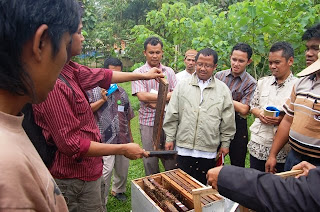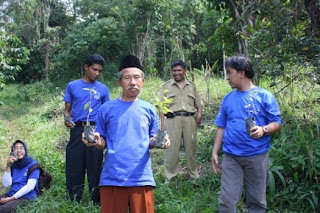Oleh Marwan Ja’far
Tiga isu besar yang acap melanda dunia ketiga dan mayoritas muslim adalah terorisme, demokrasi, dan ekologi. Faktanya, memang di negeri muslim pula ketiga hal tersebut berada dan lebih banyak disorot. Khusus isu ekologi, hal ini amat jelas betapa negeri muslim tidak mengindahkan aturan yang ada dalam agama sendiri.
Seiring karut-marut ekologis, rasanya perlu dikedepankan suatu pendekatan religius yang dikenal dengan istilah fikih lingkungan. Pengistilahan fikih lingkungan memang sudah pernah digulirkan oleh KH Ali Yafie dalam bukunya Merintis Fikih Lingkungan Hidup (1994) dan KH Sahal Mahfudz lewat bukunya Nuansa Fikih Sosial (1994).
Fikih menempati reputasi penting dalam peradaban Islam. Sampai-sampai seorang pemikir muslim dari Maroko, Muhammad Abid al-Jabiri, dalam bukunya Takwin al-’Aql al-’Arabi (1991) menyatakan bahwa peradaban Islam adalah peradaban fikih. Ini karena hukum Islam merupakan salah satu ruang ekspresi pengalaman agama yang amat penting.
Fikih lingkungan memiliki asumsi bahwa fikih adalah al-ahkam al-’amaliyah (hukum perilaku) yang bertanggung jawab atas pernik-pernik perilaku manusia agar selalu berjalan dalam bingkai kebajikan dan kebijakan serta tidak mengganggu pihak lain (baca: lingkungan), sehingga kemaslahatan dapat terwujud. Dalam kapasitas ini, kebenaran fikih diukur oleh relevansinya dalam menggiring masyarakat biotis ke arah yang lebih makmur, lestari, dan dinamis. Orientasi dan misi dari fikih lingkungan tidak lain adalah konservasi dan restorasi lingkungan, selaras dengan cita-cita Islam rahmatan li al-’alamin.
Teladan Islam
Upaya konservasi alam dalam Islam dapat kita lacak pada diri Nabi SAW, para sahabat, dan ulama salaf. Hal ini dapat dilihat, misalnya, beliau pernah mengajarkan cara konservasi alam melalui pencanangan konsep hima, yakni lahan konservasi. Dalam konteks sekarang, lahan tersebut sepadan dengan istilah taman kota, kawasan hijau, suaka marga satwa, dan sejenisnya. Kawasan-kawasan itu tidak diperkenankan untuk penduduk, terutama untuk kepentingan yang sifatnya eksploitatif.
Kita juga bisa melihat dari ajaran konservasi lingkungan ala Nabi yang terkandung dalam ritual ibadah haji. Orang-orang yang datang ke tanah haram (Mekah-Madinah) untuk berhaji sangat berhati-hati, termasuk dengan berbagai tanaman. Kalau mencabut satu tanaman saja, orang yang berhaji bisa didenda dengan seekor kambing. Sebab, tanaman merupakan bagian dari lingkungan sehingga barangsiapa merusaknya sedikit apa pun akan mendapat teguran langsung dari Allah. Apa yang telah dilakukan Nabi Muhammad kala itu adalah sebuah lompatan pemikiran yang sangat luar biasa dalam menjaga kelestarian lingkungan hidup manusia. Di sini, Mekah dan Madinah telah menjadi teladan bagi penjagaan lingkungan yang sangat strategis dicontoh oleh umat Islam.
Nabi Muhammad juga sangat menjaga air zam-zam. Air zam-zam, bagi masyarakat Mekah dan Madinah, sangatlah berharga. Makanya, Nabi memerintahkan umat Islam menjaganya. Dari air zam-zam inilah masyarakat Arab mendapat kemudahan dalam mendapatkan air bersih. Bahkan bagi setiap orang Indonesia yang pergi haji, oleh-oleh wajib yang selalu dinantikan adalah air zam-zam. Ini artinya, komitmen Nabi dalam menjaga saluran hidup bersih dengan air zam-zam sangat terasa manfaatnya bagi umat Islam.
Khalifah Umar bin Khaththab pernah bertawasul dengan Sungai Nil. Dalam tawasulnya, beliau berkata, “Ya Allah, inni atawashshalu bi ma’i nil, as’aluka lisa’adati Mishra.” Dengan air Sungai Nil, Khalifah Umar berharap rakyat Mesir mendapatkan kemakmuran dan kesejahteraan dari Allah. Apa yang dilakukan Khalifah Umar dengan tawasulnya tersebut meniscayakan penjagaan terhadap Sungai Nil. Kalau Sungai Nil dijaga, dilindungi, dan dikelola dengan baik, rakyat Mesir akan mendapat kemakmuran dan kesejahteraan. Dan terbukti, Sungai Nil telah menjadi jalur perdagangan yang luar biasa, sehingga bisa membuka peluang-peluang strategis dalam meningkatkan ekonomi masyarakat Mesir.
Dalam ranah fikih, di antaranya kita mengenal istilah tanah kosong (mawat). Guna menghidupkan tanah ini, para ulama membagi menjadi tiga macam cara, yaitu ihya’, iqtha’ dan hima. Ihya’ adalah pemanfaatan tanah kosong oleh individu tertentu untuk kepentingan dalam kehidupan orang muslim pribadi. Dalam hal ini, ada perbedaan mengenai keabsahannya. Mazhab Hanafi- berpendapat, kalau tanpa izin dari pemerintah, maka tidak sah. Sedangkan mazhab Syafi’i- berpendapat sebaliknya. Adapun iqtha’ merupakan pemanfaatan tanah yang dipelopori oleh pemerintah, di mana pemerintah memberikan tanah kepada orang-orang tertentu. Pemberian ini ada kalanya untuk dimiliki atau diambil manfaatnya sementara waktu. Kalau dalam konteks sekarang, barangkali hampir sama dengan transmigrasi. Kemudian hima, yakni pemerintah menetapkan lahan tertentu sebagai area lindung yang difungsikan untuk masyarakat umum. (Lihat Wahbah al-Zuhaili, al-Fiqh al-Islam wa Adillatuhu, Juz V, Dar al-Fikr, Damaskus,1989).
Di sinilah terlihat sebuah upaya konservasi lingkungan hidup. Dalam arti bahwa upaya menghidupkan tanah mati itu juga jangan membuat tanah menjadi mati. Ini berarti menghidupkan tanah mati (ihya’ al-mawat) merupakan sebuah terobosan pemikiran progresif ulama dalam menggerakkan pemberdayaan masyarakat. Tanah yang gersang harus direstorasi demi kemaslahatan umat.
Mashlahah
Pengetahuan dan pemahaman tentang mashlahah (maqashid al-syari’ah) merupakan hal yang sangat penting dalam fikih. Sebab, kepada landasan hukum itulah setiap persoalan dalam kehidupan manusia dikembalikan.
Hukum tidaklah selalu merupakan barang jadi yang siap pakai, melainkan harus ditemukan. Dalam banyak hal, penegakan dan pelaksanaan hukum tidak hanya sekadar penerapan hukum, tapi juga sering merupakan penemuan hukum (rechtsfinding). Karena itu, penemuan hukum merupakan conditio sine quanon dalam setiap sistem hukum yang ada.
Para ahli hukum Islam menyadari hal ini, sehingga muncul adagium yang berbunyi “teks-teks hukum itu terbatas adanya, sementara kasus-kasus hukum tiada terbatas” (al-nushush mutanahiyah, wa amma al-waqa’i’ ghair mutanahiyah). Di sinilah perlunya ijtihad.
Menjaga lingkungan hidup (hifzh al-bi’ah) jelas berada dalam bingkai mashlahah. Al-Quran hanya menyinggung tentang prinsip-prinsip konservasi dan restorasi lingkungan, seperti larangan perusakan atau larangan berlebih-lebihan (israf) dalam pemanfaatannya. Prinsip-prinsip ini dinamakan mashlahah mu’tabarah. Namun, sejauh mana kadar berlebih-lebihan serta teknis operasional penjagaan tidaklah ditemukan dalam Al-Quran. Kita harus berijtihad sendiri bagaimana, misalnya, tanah pinggir sungai supaya tidak terkena erosi. Kebutuhan untuk menjaga lingkungan tetap niscaya untuk dijalankan, karena lingkungan hidup merupakan penopang segala kehidupan ciptaan Tuhan.
Nah, melalui fikih lingkungan (fiqh al-bi’ah), pesan lingkungan dari agama bisa ditransfer dan menjadi inspirasi baru bagi pengelolaan lingkungan hidup. Rumusan fikih lingkungan sejatinya dapat digunakan sebagai panduan tindakan preventif agama supaya perilaku manusia tidak melawan alam.
Walhasil, menjaga lingkungan bukan lagi sekadar wajib kifayah, melainkan berhukum wajib ‘ain, yakni kewajiban yang hanya bisa gugur apabila setiap insan di muka bumi ini menunaikannya. Inilah produk fikih lingkungan (fiqh al-bi’ah) yang mewajibkan menjaga lingkungan dan mengharamkan merusak lingkungan.
(Sumber: Koran Tempo, 27 Agustus 2010)
*) Marwan Ja’far, Ketua Fraksi PKB DPR R


